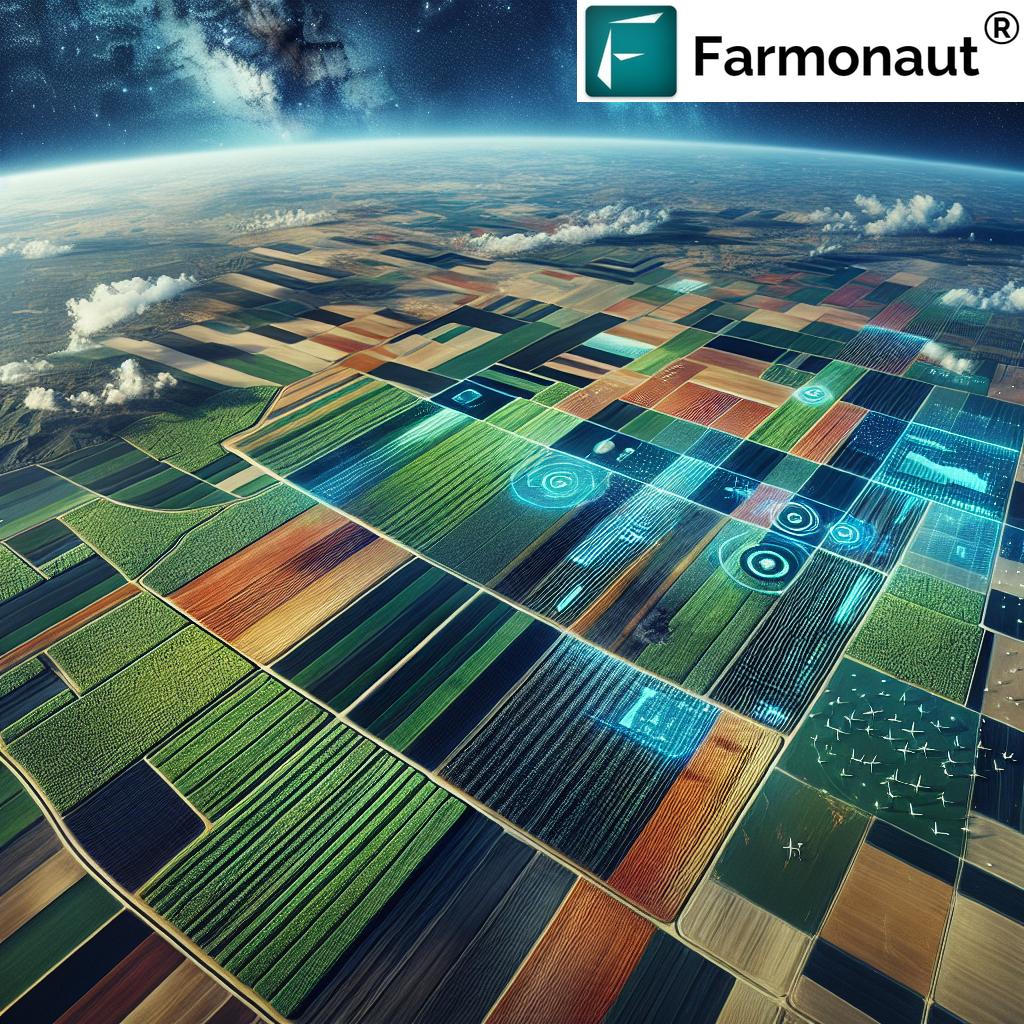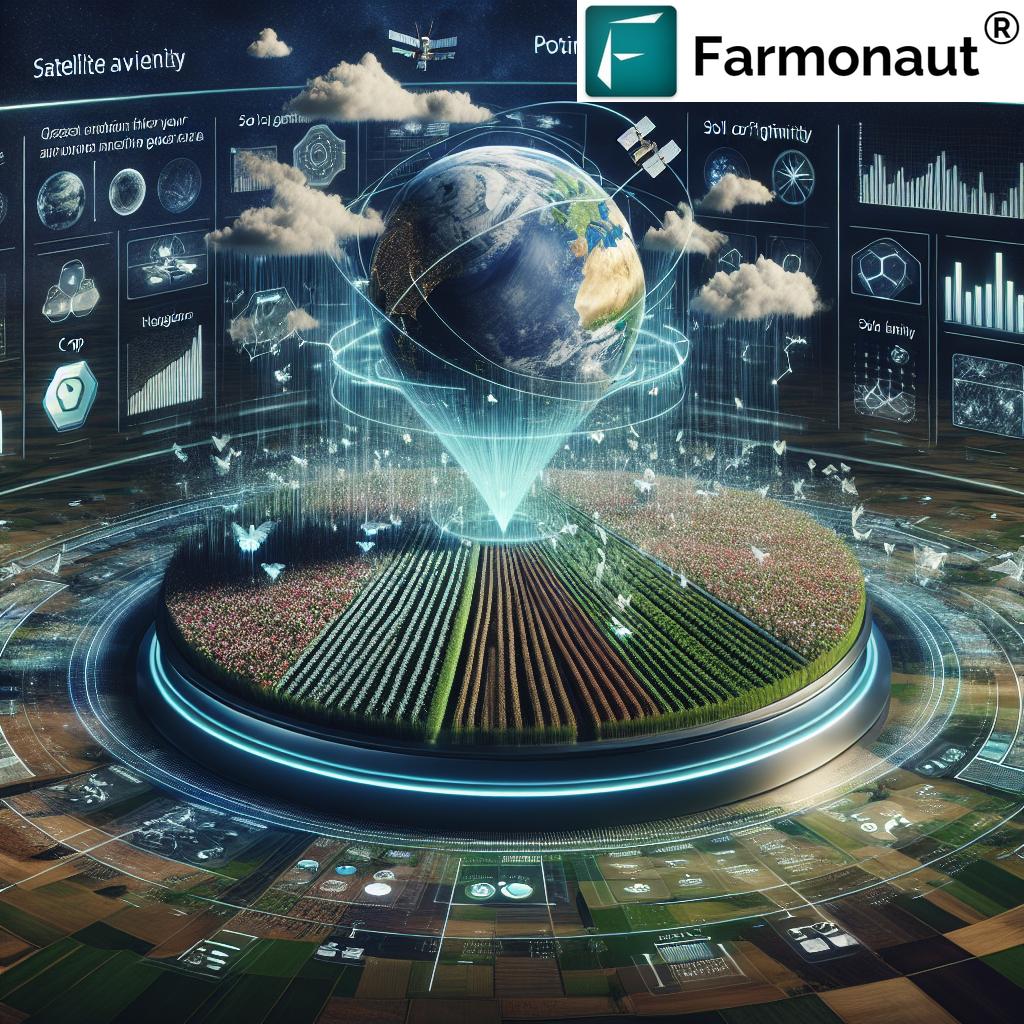Revolutionizing Agriculture: Precision Satellite Monitoring for Enhanced Crop Yield and Soil Management
“Satellite crop monitoring provides daily updates on field conditions, analyzing over 1 million acres globally every 24 hours.”
In the ever-evolving landscape of agriculture, we find ourselves at the forefront of a technological revolution that promises to transform the way we grow, manage, and harvest our crops. As we delve into the world of precision agriculture techniques and satellite crop monitoring, we’re witnessing a paradigm shift in sustainable farming practices that’s reshaping the agricultural industry. At Farmonaut, we’re proud to be at the cutting edge of this transformation, offering innovative solutions that merge traditional farming wisdom with geospatial intelligence.
The Dawn of Precision Agriculture
Precision agriculture represents a seismic shift in how we approach farming. By leveraging advanced technologies, we can now make data-driven decisions that optimize every aspect of crop production. This approach not only enhances yield but also promotes sustainability by minimizing resource waste and environmental impact.
- Satellite-based monitoring
- Soil fertility management
- Advanced agronomy solutions
- Agricultural data analytics
These components work in harmony to create a comprehensive system that revolutionizes traditional farming methods. Let’s explore how each of these elements contributes to the bigger picture of modern agriculture.
Satellite Crop Monitoring: Eyes in the Sky
At the heart of precision agriculture lies satellite crop monitoring, a technology that provides farmers with unprecedented insights into their fields. By harnessing the power of high-resolution satellite imagery, we can now observe and analyze vast agricultural areas with remarkable detail and frequency.
Our satellite monitoring technology at Farmonaut offers daily updates on crop health and field conditions. This continuous stream of data allows farmers to:
- Track vegetation health using NDVI (Normalized Difference Vegetation Index)
- Monitor soil moisture levels
- Detect early signs of pest infestations or disease outbreaks
- Assess crop growth stages
By providing this level of detail, satellite monitoring empowers farmers to make timely and informed decisions about irrigation, fertilization, and pest management strategies.
Soil Fertility Management: The Foundation of Healthy Crops
Soil is the lifeblood of agriculture, and managing its fertility is crucial for sustainable farming. With precision agriculture techniques, we can now analyze soil composition and health with unprecedented accuracy. This allows for targeted interventions that optimize soil conditions for specific crops.

Key aspects of soil fertility management include:
- Soil organic carbon assessment
- Nutrient mapping
- pH level monitoring
- Soil moisture analysis
By understanding these factors, farmers can tailor their fertilization and irrigation strategies to meet the specific needs of their crops, leading to improved yields and reduced environmental impact.
Advanced Agronomy Solutions: Science Meets Farming
Agronomy, the science of soil management and crop production, has been revolutionized by the integration of advanced technologies. These solutions combine traditional agronomic knowledge with cutting-edge data analytics to provide farmers with actionable insights.
Our advanced agronomy solutions at Farmonaut include:
- Crop yield prediction models
- Field boundary mapping
- Crop classification algorithms
- Harvest monitoring systems
These tools enable farmers to optimize their planting schedules, predict potential yields, and manage their resources more efficiently throughout the growing season.
Agricultural Data Analytics: Turning Information into Action
The true power of precision agriculture lies in its ability to collect and analyze vast amounts of data. Agricultural data analytics transforms raw information into actionable insights that drive decision-making on the farm.
Key benefits of agricultural data analytics include:
- Improved crop yield prediction
- Enhanced resource allocation
- Early detection of potential issues
- Optimization of farming practices
By leveraging these analytics, farmers can make data-driven decisions that lead to increased productivity and sustainability.
“High-resolution satellite imagery can detect plant health variations as small as 10 cm, enabling precise crop management decisions.”
Innovative Crop Management Strategies
The integration of precision agriculture techniques has given rise to a new era of crop management. These innovative strategies are tailored to the specific needs of each field, crop type, and even individual plants.
Some of the most effective crop management strategies include:
- Variable rate application of inputs
- Precision irrigation systems
- Targeted pest and disease management
- Site-specific harvesting techniques
By implementing these strategies, farmers can maximize their yields while minimizing waste and environmental impact.
The Role of Geospatial Intelligence in Modern Farming
Geospatial intelligence plays a crucial role in modern farming by providing a comprehensive view of agricultural landscapes. This technology allows us to analyze spatial patterns, track changes over time, and make predictions based on historical and real-time data.

At Farmonaut, we harness the power of geospatial intelligence to provide:
- Accurate field boundary mapping
- Crop type classification
- Detection of anomalies in crop growth
- Analysis of land use changes
These capabilities enable farmers to make informed decisions about land management, crop rotation, and resource allocation.
Sustainable Farming Practices: A Path to the Future
As we face global challenges such as climate change and population growth, sustainable farming practices have become more critical than ever. Precision agriculture and satellite crop monitoring are at the forefront of this sustainability movement.
Key sustainable farming practices enabled by these technologies include:
- Reduced use of water and chemicals
- Conservation of soil health
- Minimized environmental impact
- Increased crop diversity
By adopting these practices, farmers can ensure the long-term viability of their operations while contributing to global food security.
Specialized Crop Management: From Beets to Grapes
Different crops require specialized management approaches, and precision agriculture allows us to tailor our strategies to the unique needs of each crop type. Let’s explore some examples:
Growing Beets: Precision in Root Crop Management
Beet cultivation benefits greatly from precision agriculture techniques. By using satellite monitoring and soil analysis, we can:
- Optimize planting density
- Manage nitrogen levels precisely
- Monitor root development
- Predict optimal harvest times
These strategies lead to improved beet quality and higher sugar content, which is crucial for both table beets and sugar beet production.
Grape Cultivation: Enhancing Vineyard Management
In viticulture, precision agriculture plays a vital role in producing high-quality grapes. Our technology enables vineyard managers to:
- Monitor vine stress levels
- Manage irrigation with pinpoint accuracy
- Detect early signs of disease or pest infestations
- Optimize harvest timing for ideal grape maturity
These capabilities result in improved wine quality and more efficient vineyard operations.
Addressing Plant Diseases: The Case of Verticillium Wilt
Plant diseases can devastate crops, but precision agriculture offers new tools for early detection and management. Verticillium wilt, a fungal disease affecting various crops, serves as an excellent example of how these technologies can make a difference.
Using satellite monitoring and advanced analytics, we can:
- Detect early signs of verticillium wilt infection
- Map the spread of the disease across fields
- Implement targeted treatment strategies
- Monitor the effectiveness of control measures
This proactive approach helps farmers minimize crop losses and reduce the need for widespread chemical applications.
The Future of Agriculture: Integrating Technology and Tradition
As we look to the future, it’s clear that the integration of precision agriculture techniques with traditional farming wisdom will be key to addressing global agricultural challenges. This fusion of old and new creates a powerful synergy that can drive sustainable growth in the agricultural sector.
Some emerging trends in this integration include:
- AI-powered decision support systems
- Blockchain technology for supply chain transparency
- IoT sensors for real-time field monitoring
- Robotics and automation in farming operations
At Farmonaut, we’re committed to being at the forefront of these innovations, providing farmers with the tools they need to succeed in an ever-changing agricultural landscape.
Empowering Farmers, Agronomists, and Agricultural Cooperatives
The benefits of precision agriculture and satellite crop monitoring extend beyond individual farmers. These technologies are empowering entire agricultural ecosystems, including:
- Agronomists developing tailored crop management plans
- Agricultural cooperatives optimizing resource allocation
- Research institutions advancing crop science
- Policy makers crafting data-driven agricultural policies
By providing access to advanced tools and insights, we’re helping to create a more resilient and productive agricultural sector.
Farmonaut: Your Partner in Precision Agriculture
At Farmonaut, we’re dedicated to making precision agriculture accessible and affordable for farmers worldwide. Our platform integrates cutting-edge satellite technology with sophisticated algorithms to provide daily updates on crop health and field conditions.
Key features of our platform include:
- High-resolution satellite imagery analysis
- AI-powered crop health monitoring
- Advanced weather forecasting
- Customizable alerts and notifications
We invite you to explore our solutions and see how they can transform your farming operations:
For developers interested in integrating our technology into their own solutions, we offer a comprehensive API:
Comparison of Precision Agriculture Technologies
| Technology | Primary Function | Data Collection Method | Update Frequency | Key Benefits | Estimated Yield Improvement (%) | Suitable Crop Types | Implementation Complexity |
|---|---|---|---|---|---|---|---|
| Satellite Crop Monitoring | Wide-area crop health assessment | Multispectral imagery | Daily | Large-scale monitoring, historical data | 10-20% | All field crops | Low |
| Drone Imagery | Detailed field mapping | High-resolution imagery | On-demand | Precise, timely data collection | 5-15% | High-value crops | Medium |
| IoT Sensors | Real-time environmental monitoring | In-field sensors | Continuous | Immediate alerts, localized data | 8-18% | All crops | Medium |
| GPS-guided Equipment | Precise field operations | GPS tracking | Real-time | Reduced overlap, efficient resource use | 7-13% | Large-scale row crops | Medium |
| Soil Sensors | Soil health monitoring | In-soil probes | Continuous | Precise nutrient management | 6-12% | All crops | Low |
Subscription Plans
Frequently Asked Questions
Q: How often is satellite data updated in Farmonaut’s system?
A: Our satellite data is updated daily, providing you with the most current information about your fields.
Q: Can Farmonaut’s technology be used for all types of crops?
A: Yes, our technology is suitable for a wide range of crops, from grains and vegetables to fruit orchards and vineyards.
Q: How accurate is the crop yield prediction feature?
A: Our crop yield prediction models have shown accuracy rates of up to 90% in many cases, though this can vary depending on factors such as crop type and local conditions.
Q: Is Farmonaut’s platform suitable for small-scale farmers?
A: Absolutely! We’ve designed our platform to be scalable and accessible for farmers of all sizes, from small family farms to large agricultural operations.
Q: How does Farmonaut ensure the security of farmers’ data?
A: We take data security very seriously. All data is encrypted and stored securely, and we adhere to strict privacy policies to protect our users’ information.
Conclusion: Embracing the Future of Farming
As we’ve explored throughout this blog, precision agriculture and satellite crop monitoring are revolutionizing the way we approach farming. These technologies offer unprecedented insights into crop health, soil conditions, and environmental factors, enabling farmers to make data-driven decisions that optimize yield and promote sustainability.
At Farmonaut, we’re committed to making these advanced tools accessible to farmers around the world. By combining cutting-edge technology with user-friendly interfaces, we’re empowering agricultural professionals to embrace the future of farming while building on the wisdom of traditional practices.
As we look to the future, it’s clear that the integration of precision agriculture techniques will be crucial in addressing global food security challenges and promoting sustainable agricultural practices. We invite you to join us on this journey towards a more efficient, productive, and sustainable agricultural future.
Explore our platform, try our tools, and discover how Farmonaut can transform your farming operations. Together, we can cultivate a brighter future for agriculture and ensure a sustainable food supply for generations to come.






